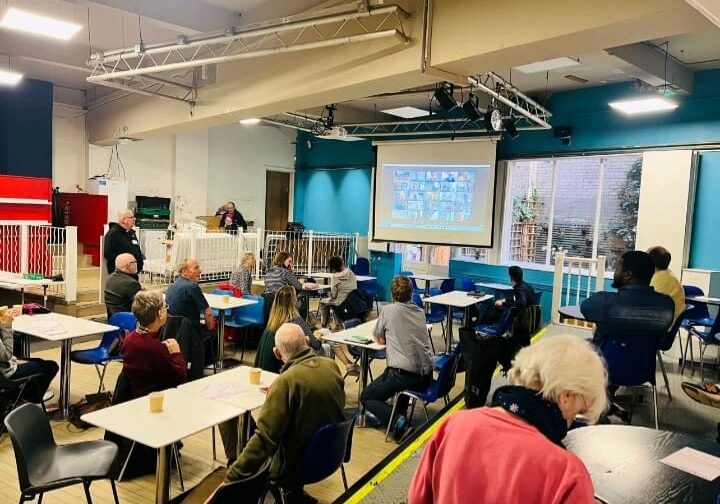“I can see it in my own community and can see the inequality” – “the current system is not working”.
“Poverty is injustice”.
“It is a scandal that can be addressed,” and “we can’t trust politicians to do it.”
These are responses from over 100 people asked to complete the sentence “I am motivated to end poverty in the UK because…”, shared at the founding assembly in Manchester of a new national movement.
Let’s End Poverty is a growing collective of groups and individuals working towards a vision of a UK “where poverty can’t keep anyone down” – where food banks, clothes banks and warm hubs are no longer needed, and where “all of us are able to wake up in the morning with hope, opportunities and options for living a fulfilling life”.
Approximately 14.4 million people in the UK are currently experiencing poverty, and around 3.8 million people are now living in destitution, lacking the basics to keep warm, dry, clean and fed.
Meanwhile, the chancellor’s Autumn statement of 22 November has been criticised for its “poverty of ambition”, making a collective call for urgent action more needed than ever.
The Let’s End Poverty founding assembly took place in October with gatherings in Manchester, Liverpool, London, Nottingham, Cambridge, Newcastle, Leeds, Cardiff, Glasgow and online.
Attendees shared stories about what motivated them to join the movement, including their experiences of poverty both firsthand and in the communities they live and work in.

Reverend Ian Rutherford is the city centre minister at Manchester’s Methodist Central Hall, which was the venue for the Let’s End Poverty launch event in the city.
Reflecting on the event, Rutherford said:
“What was great about it, is that it seems to have brought together so many different organisations into one room with the same aim in mind, which was to be part of a movement of people who are united behind this vision to end poverty.”
Manchester and Greater Manchester have done a lot of work over the years on fighting poverty across different charities, faith groups, organisations and unions, says Rutherford.
“We’ve all got particular campaigns that we’re engaged with. But actually, we’ve never really been in one movement. So this event was all about getting into the same space and saying, right, let’s all work together and speak with one voice about this.”
Along with the Methodist Central Hall, other local organisations currently affiliated with Let’s End poverty include: The Cherry Tree Project in Romiley; The Dandelion Community in Wythenshawe; Caritas Diocese of Salford; St Stephen & All Martyrs church; Stockport Food Network and the United Reformed Church North Western Synod, as well as the national organisation Church Action on Poverty which is headquartered in Salford.
These organisations are already working on the ground to tackle poverty in their communities. By joining Let’s End Poverty, they are adding their voices to a collective call to the UK government for urgent, coordinated action on poverty.
“It’s really important for us in Greater Manchester to be at the forefront of this”, says Rutherford, referencing his existing work with the mayor on issues such as homelessness and food security.
“From those issues, you know that it’s only going to work if all the different sectors come together to do something about it, and we’ve got into the habit of doing that in Greater Manchester now. So being able to put all of our efforts into the poverty question is going to be really massive.”

Manchester’s role in the fight against poverty
Manchester is an area most acutely affected by this issue, with recent figures showing a staggering 44.7% of the city’s children are living in poverty.
“Manchester really has to care about its role in all of this, because if you look at all of the indices, and all of the data, we have had it difficult for many years here in this area,” says Rutherford. “And there are parts of all of the ten boroughs that are in major poverty, and the inequalities that are there are very stark.”
He also highlights the work that he and others are doing to “change the narrative” around poverty.
“There are economic discrepancies that really need to be rectified at the systemic level for us to be able to move forward here. And that’s no fault of any person. They’re just simply caught into that poverty trap.”
Shifting attitudes
And public attitudes towards poverty do appear to be shifting.
The British Social Attitudes Survey released this autumn shows a marked decrease in anti-welfare sentiment, as well as a rise in support for more government spending to alleviate poverty.
The number of people who agree that ‘most people who get social security don’t really deserve any help’ has more than halved, from 40% in 2005 to 19% today.
37% of people think that the government should spend more money on welfare benefits for the poor, even if it leads to higher taxes, up from 29% in 2010.
Christians Against Poverty’s (CAP) recent YouGov polling shows around nine in ten (88%) of the UK’s adult population feel more should be done to tackle poverty.

Upcoming actions
The Let’s End Poverty movement includes monthly action gatherings that bring urban, rural and coastal communities across the country together online to share stories and plan action.
The first of these gatherings took place on 23 November 2023. Attendees shared feedback from the founding assembly and discussed future actions, including working with MPs to put pressure on government and developing artistic projects to share experiences of poverty and the vision of a country without it.
Those looking to get involved can join Let’s End Poverty’s webinar on 8 January 2024, or the next Action Gathering on 24 January 2024.
Sign up to The Meteor mailing list – click here
The Meteor is a media co-operative on a mission to democratise the media in Manchester. To find out more – click here
All images: Alice Toomer-McAlpine


Leave a Reply